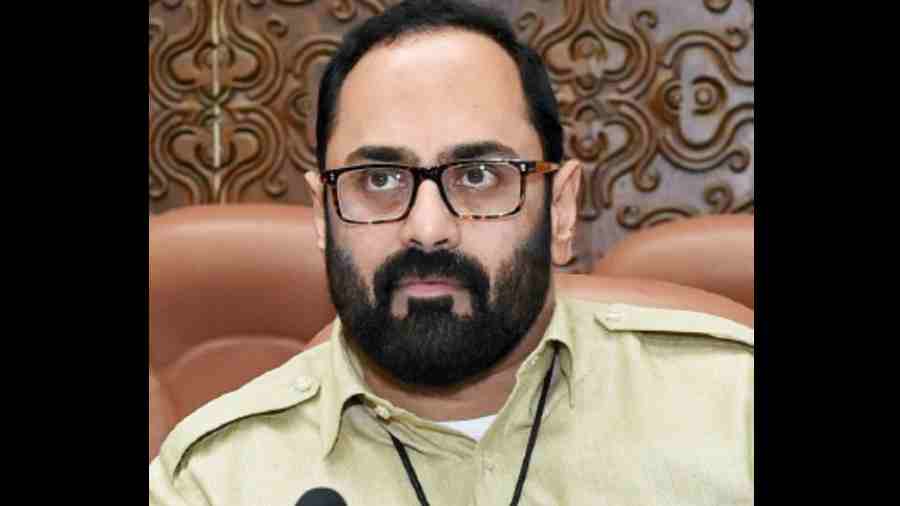Rajeev Chandrashekhar, the minister of state in the ministry of electronics and information technology, is a media baron himself, and was an investor of Republic TV with Arnab Goswami. He is now presiding over the frequent widening of the ambit of the rules of the Information Technology Act, 2000 to police free expression, but he couches it differently. “The draft amendments to IT Rules are in pursuance of our commitment to an Open, Safe & Trusted and Accountable Internet,” he said this month. You could read that as sanitised or censored, depending on where you are coming from.
Blocking the online sharing of a BBC documentary has led to an uproar. As the Internet Freedom Foundation and others have pointed out, in the case of some 50 tweets directed to be taken down by Twitter, no show-cause notice was given, no reasons recorded, the text of blocking orders not given to the authors of the tweets, and neither was any press release issued. The blocking of links to the BBC documentary used emergency powers under IT rules 2021 and Section 69A of the IT Act, 2000. It has been pointed out that the term, emergency, is not legislatively defined.
One could ask whether “propaganda reflecting a colonial mindset”, to quote the official reason given for blocking the BBC programme, qualifies as an emergency?
The documentary’s circulation here is only the latest victim of government rule-making. Laws are passed by Parliament, the rules are drafted subsequently. Gnomes in Mr Chandrasekhar’s domain are going a bit berserk. As the lawyer, Apar Gupta, has pointed out, the IT rules are now in a permanent state of proposed amendment.
In February 2021, a new batch of rules had sought to bring publishers of news and current affairs content, publishers of online curated content as well as news aggregators under its ambit. It subjected them to a code of ethics and procedure and safeguards in relation to digital media which would be administered by the ministry of information and broadcasting.
More than 20 challenges have been filed in the high courts against these rules since 2021. Many of these are focused on the code of ethics sought to be established for online news platforms. When the Central government sought to transfer these cases to the Supreme Court, the apex court issued notice and stayed the existing proceedings but refused to interfere with the interim orders given; so these still hold. The Bombay High Court and the Madras High Court are among those which have given interim orders.
After 2021, the IT rules had been amended again in 2022 and thereafter already twice this year. The last of these is an amendment proposed to rule 3(1)(b) (v) of the IT Rules, which reads “violates any law for the time being in force”. The proposed amendment empowers the Press Information Bureau to fact-check “misinformation or patently false and untrue or misleading information on social media and other intermediary platforms” by amending the rules for online gaming. Another uproar ensued as journalists’ bodies reacted to this.
Even as the rules are being progressively widened in application, the blocking of Twitter URLs under these IT rules has gathered steam. The Commonwealth Human Rights Initiative has put out the following statistics based on responses to a series of Right to Information applications. According to information given in the Lok Sabha by the Union government, the number of orders to block Twitter rose from 8 in 2014, when the Narendra Modi-led government came to power, to 1,122 in the first six months of 2022. There was a quantum jump from the year 2019 onwards.
The number of Twitter URLs blocked during the year 2022 was 20% higher than the figure of blocks for 2021. There was a 3.5% rise in the number of instances in which social and digital media content (other than Twitter) was directed to be blocked during the year 2022, as compared to similar action taken in 2021.
What’s more, the government’s committee appointed to issue directions to block public access to content on Twitter and other social and digital media platforms met 39 times in 2021 and 53 times in 2022. Is this then a case of progressive paranoia?
This committee functions under a confidentiality clause, so transparency is a casualty. The CHRI says that MeitY has refused to share the materials placed before this committee, its proceedings and also those of the committee which reviews such directions, citing a ‘confidentiality’ clause in the Information Technology (Procedures and Safeguards for Blocking for Access of Information by Public) Rules, 2009. MeitY has also refused to publicly disclose the papers relating to a case where the blocking orders against some tweets are currently being heard by the Karnataka High Court behind closed doors.
In short, the “Open, Safe & Trusted and Accountable Internet” is neither open nor accountable. The BBC documentary has done us a favour by focusing attention on State-decreed blocking.
Meanwhile, to the outpouring of comment on the BBC’s decision to air this series, let me add a little context. BBC 2 airs documentaries on political figures around the world. It did not single out our prime minister for this honour. The list includes Donald Trump, Jair Bolsonaro, Viktor Orbán and Recep Tayyip Erdogan. The one on Narendra Modi is the latest in this series. Each of the above is a controversial leader whose profile has been researched in some depth. They contain some revelations unlikely to be aired by the media in their home countries, except perhaps in the case of Trump. In our case, it was footage and commentary that are no longer part of the public record here.
Sevanti Ninan is a media commentator and was the founder-editor of TheHoot.org










